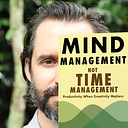Member-only story
Three things nobody told you about writing a book
Books are mysterious. Until you’ve written one, it’s hard to imagine how anyone ever manages to write one.
I wasn’t one of those kids who always dreamed of writing a book. I became writer by accident. I wrote a blog post, and I got a book deal for my first book.
I got lucky the first time around. For my second book, I had to shed many false beliefs about writing a book.
Here’s what I wish someone would have told me years ago:
1. Writing doesn’t have to be hard
When you don’t have much experience writing, chances are it’s hard to string together 250 coherent words. Logically, you would then expect that writing 25,000 or 50,000 words would be unbelievably hard.
But getting good at writing isn’t a linear process. Writing 25,000 coherent words doesn’t have to be one-hundred times as hard as writing 250.
Growing your writing skill is like going to the gym. The hard work you do makes it easier to do the same amount of exercise later on. You get stronger, and what seemed impossible becomes easy.
You write 250-word pieces a bunch of times, and writing 250 words becomes easy. You write a bunch of 500-word pieces, then those get easy. Then you do 1,000.
